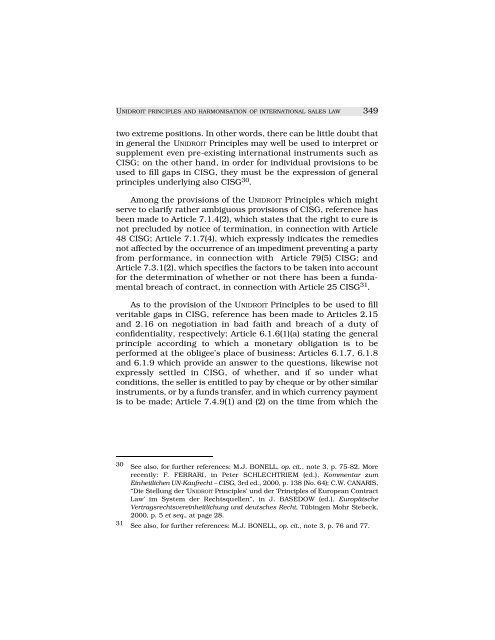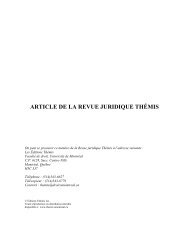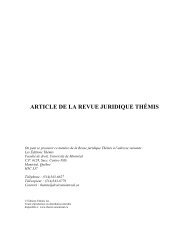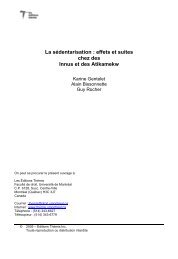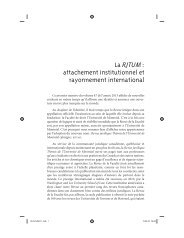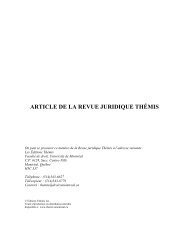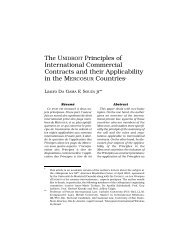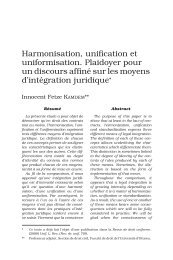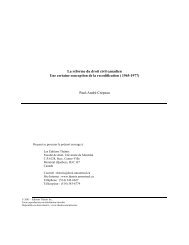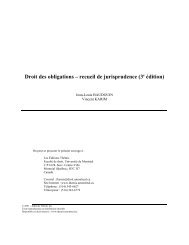The UNIDROIT Principles of International Commercial Contracts and ...
The UNIDROIT Principles of International Commercial Contracts and ...
The UNIDROIT Principles of International Commercial Contracts and ...
You also want an ePaper? Increase the reach of your titles
YUMPU automatically turns print PDFs into web optimized ePapers that Google loves.
<strong>UNIDROIT</strong> PRINCIPLES AND HARMONISATION OF INTERNATIONAL SALES LAW 349<br />
two extreme positions. In other words, there can be little doubt that<br />
in general the <strong>UNIDROIT</strong> <strong>Principles</strong> may well be used to interpret or<br />
supplement even pre-existing international instruments such as<br />
CISG; on the other h<strong>and</strong>, in order for individual provisions to be<br />
used to fill gaps in CISG, they must be the expression <strong>of</strong> general<br />
principles underlying also CISG 30 .<br />
Among the provisions <strong>of</strong> the UN I D R O I T <strong>Principles</strong> which might<br />
serve to clarify rather ambiguous provisions <strong>of</strong> CISG, reference has<br />
been made to Article 7.1.4(2), which states that the right to cure is<br />
not precluded by notice <strong>of</strong> termination, in connection with Article<br />
48 CISG; Article 7.1.7(4), which expressly indicates the re m e d i e s<br />
not affected by the occurrence <strong>of</strong> an impediment preventing a party<br />
f rom perf o rmance, in connection with Article 79(5) CISG; <strong>and</strong><br />
Article 7.3.1(2), which specifies the factors to be taken into account<br />
for the determination <strong>of</strong> whether or not there has been a fundamental<br />
breach <strong>of</strong> contract, in connection with Article 25 CISG 31 .<br />
As to the provision <strong>of</strong> the UN I D R O I T <strong>Principles</strong> to be used to fil l<br />
veritable gaps in CISG, re f e rence has been made to Articles 2.15<br />
<strong>and</strong> 2.16 on negotiation in bad faith <strong>and</strong> breach <strong>of</strong> a duty <strong>of</strong><br />
c o n fidentiality, respectively; Article 6.1.6(1)(a) stating the general<br />
principle according to which a monetary obligation is to be<br />
p e rf o rmed at the obligee’s place <strong>of</strong> business; Articles 6.1.7, 6.1.8<br />
<strong>and</strong> 6.1.9 which provide an answer to the questions, likewise not<br />
e x p ressly settled in CISG, <strong>of</strong> whether, <strong>and</strong> if so under what<br />
conditions, the seller is entitled to pay by cheque or by other similar<br />
instruments, or by a funds transfer, <strong>and</strong> in which currency payment<br />
is to be made; Article 7.4.9(1) <strong>and</strong> (2) on the time from which the<br />
30 See also, for further references: M.J. BONELL, op. cit., note 3, p. 75-82. More<br />
recently: F. FERRARI, in Peter SCHLECHTRIEM (ed.), Kommentar zum<br />
Einheitlichen UN-Kaufrecht – CISG, 3rd ed., 2000, p. 138 (No. 64); C.W. CANARIS,<br />
“Die Stellung der ‘<strong>UNIDROIT</strong> <strong>Principles</strong>’ und der ‘<strong>Principles</strong> <strong>of</strong> European Contract<br />
Law’ im System der Rechtsquellen”, in J. BASEDOW (ed.), E u ro p ä i s c h e<br />
Ve r t r a g s re c h t s v e reinheitlichung und deutsches Recht, Tübingen Mohr Siebeck,<br />
2000, p. 5 et seq., at page 28.<br />
31 See also, for further references: M.J. BONELL, op. cit., note 3, p. 76 <strong>and</strong> 77.


